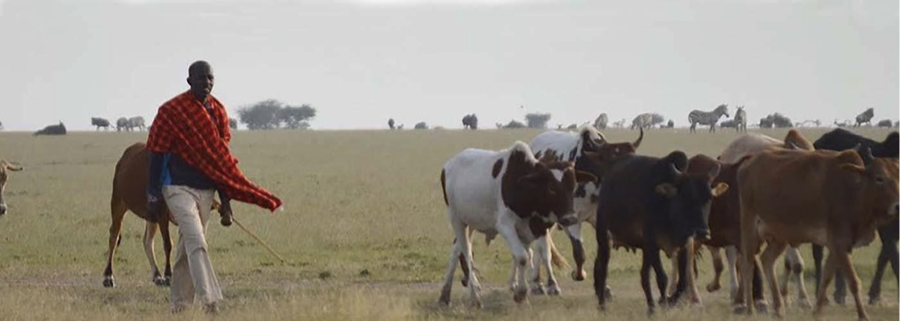Program Chair, John Angelo (aka Superman) introduced our speaker for the day—Mary Poole,
whom we have tried to schedule twice  before. She was supposed to be in Kenya but due to COVID-19 issues with international travel, she was available for a ZOOM meeting. Lucky us!
before. She was supposed to be in Kenya but due to COVID-19 issues with international travel, she was available for a ZOOM meeting. Lucky us!
 before. She was supposed to be in Kenya but due to COVID-19 issues with international travel, she was available for a ZOOM meeting. Lucky us!
before. She was supposed to be in Kenya but due to COVID-19 issues with international travel, she was available for a ZOOM meeting. Lucky us! Dr. Mary Poole, a professor at Prescott College in History, is co-Director of the Institute for Maasai Education, Research and Conservation (MERC) for the past dozen years, and working with Meitamei Olol Dapash for the past couple decades for the cultural survival of the Maasai community of East Africa. She has collaborated on four large Rotary water projects in Maasailand over the past ten years, the most recent one in Talek completed in August 2019.
Her talk focused on AZ Rotary water projects over the past seven years to help the Maasai people in Kenya. She indicated that they are a very resourceful people that live in villages and herd cattle, goats and sheep. Their culture is actually built around cattle. They try to live in peaceful coexistence with wildlife in the area including elephants, giraffe, cheetahs and leopards. Conservationists at heart, the villagers identify various animals by name and they are dedicated to the survival of wildlife in the area. Their houses are made of cow dung.
 The job of women in the culture is to find water—often needing to walk up to ten miles away. They make jewelry to sell to provide funds for their children’s uniforms, books and tuition since education is not free. Dr. Poole has helped Maasai women establish a cooperative to help them sell their jewelry.
The job of women in the culture is to find water—often needing to walk up to ten miles away. They make jewelry to sell to provide funds for their children’s uniforms, books and tuition since education is not free. Dr. Poole has helped Maasai women establish a cooperative to help them sell their jewelry. She spoke about several water projects involving Prescott Rotary, Sedona and Rotary 100 with a common theme of trusting the leadership of the local culture by assuring that the local community is a full and equal partner. This means when problems occur, the local community is able to fix them. She said that some-times it takes two to three years of meetings before a project is in place because they must consider the needs of all the people as well as the wildlife so they can deter-mine how they can best share the water.
Four projects have included:
_Erusiai Rotary Water Project—2008, a $98,000 Prescott Rotary project that impacted 30,000 Maasai.
_Mosiro Rotary Water Project—2010, a $98,000 Sedona Rotary project impacting 8,000+ people. This was a very challenging project in a very dry place with only one spigot so people and cattle had to wait in line all day for their chance to get water. It is now a green spot, with a girl’s dorm and clinic—”a thriving transformation,” she said.
_The EorrEmayian Project with Rotary clubs from NC, CO, NM and AZ to be completed in 2020 at a cost of $146,000 with affect 7,500 people. This project deals with polluted water due to agricultural issues to the north of Maasailand.
_Finally, the Endoynio Oloip project sponsored by Rotary 100 at a cost of $134,000 affecting 5,700 people—a gravity-feed water project about seven miles in length watering the whole area. Hygiene training needs to be completed.
With more accessible water, women can now go to local kiosks in the village to secure their water. Schools, Mary indicated, are sorely lacking in supplies and materials but accessibility to water allows for providing meals and proper hygiene for the students. Children learn Swahili and English.
The success of projects like those mentioned are evaluated on five major criteria:
1. Number of people who can access water
2. Increase in school enrollment
3. Other school improvements
4. Improved maternal health
5. Improved economic conditions for women